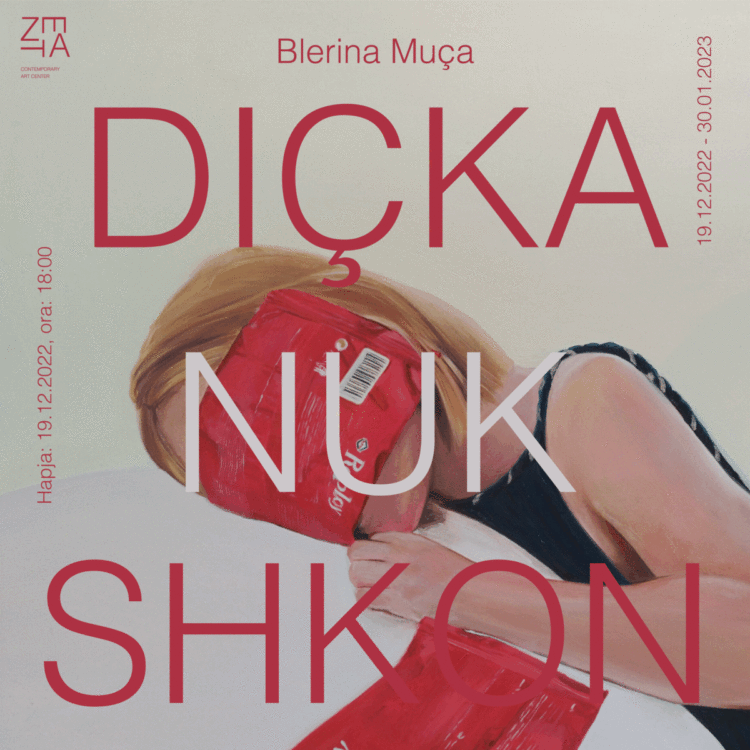Blerina Muҫa
SOMETHING’S WRONG
A Solo Exhibition curated by Marko Stamenkoviç
19/12/2022 – 30/01/2023
Opening: Monday, December 19, 19:00
@ZETA Contemporary Art Center – Tirana
How can unusual human behavior in ostensibly benign or trivial situations undermine customary social norms and can it thus contribute to a deeper sense of personal freedom – for the ones who only may appear to act strangely, but even more so for the ones who are able to recognize the disruption of a convention when observing the scene? On the occasion of her first solo exhibition, Blerina Muҫa presents a body of work revolving around these questions.
Produced between 2015 and 2022, it encompasses a selection of her paintings from three related cycles: Playground, Roi Somewhere Home, and Isolation. They include large-size acrylics on canvas and on fabric, and a number of acrylics, smaller in size, done on either canvas, fabric, wood, or ceramics (alongside her single self-portraits in digital format, never exhibited before). The most common visual feature they all share are autobiographical figurative scenes that consist either of single or group representations of children and adults, both male and female, who happen to be mainly Muҫa’s family members. They are all united by a thin line that weaves a network of meaning through visual episodes of Muҫa’s everyday life – perceived from a perspective focused on someone’s ‘strange’ actions that only may appear senseless, but they may also turn out to be something more and something serious. Most of Muҫa’s paintings are deprived of any clear background into which she situates her figures – and there is a good reason for that: rather than being focused on the notion of space, she scrutinizes the essence of an ambiguous moment of perception that triggers her attention the most, by the attractiveness and astonishment in front of a scene, and its repetition over time – something that she experiences as a cramp in her own body that allows her to capture the essence of both beauty and horror in each of those fragments of time. By bringing them to the public, for the first time together, she reveals the closely examined situations – from her personal environment and within close family circles – as visual snippets that run counter to the fixed rules of rational or normative behavior. However, even though the atmosphere and references in her visual universe are highly autobiographical, at the same time her figures remain conspicuously alienated and depersonalized. Their facelessness, or hardly recognizable facial expressions, and often absurd-looking bodily gestures and positions, indicate something significant: rather than being portraits in a proper sense of the term, Muҫa often converts the exposure of her figures into some sort of counter-portraits. This counter-portraiture is another playful response – this time, on behalf of the artist herself – to the ‘strange games’ performed by her family members.
But Muҫa’s critical perception does not exhaust itself in private reflections on the contradictory personal feelings when confronted with visually astonishing family episodes proper to her husband, her son, her daughter, her sister, and so on. Quite to the contrary, she gives an exemplary personal insight into a behavioral pattern according to which the entire community of people – a society at large – functions and operates nowadays in private and public spaces, especially in an absurd and surreal, ‘parallel life’ of the digital social media world. This is where ‘acting strangely’ is taken so much for granted and elevated to the degree of a global social norm that the more frequently and extravagantly you expose yourself over the Internet channels, the more of a virtual pop-star you may become (or a questionable role model, even). Contrary to this, Muҫa’s insight into her own version of a ‘parallel family life’ discloses the silent manifestations of deliberate individual objections to established interpersonal habits and social norms and invites us to join her on an experimental visual journey towards a personal paradigm shift, both hers and ours,in a directionthat makes it possible, perhaps, to reach another state of being – the state beyond easily acceptable borderlines between ‘black and white’, between ‘right and wrong’.
BLERINA MUҪA is a visual artist born in 1985 in Fier, Albania. She studied painting at the Academy of Arts in Tirana where she graduated in 2008. She lives and works in Tirana as an art educator at the French-Albanian School “Victor Hugo”. Before her solo show at ZETA Contemporary Art Center (2022), she took part in group exhibitions such as: “ARDHJE Award for the Young Visual Artist of Albania”, ZETA Contemporary Art Center, Tirana (2018); “Idromeno Prize 2017”, Art Gallery, Shkodra (2017); “… in a day like any other”, ZETA Contemporary Art Center, Tirana (2015); and “Painting of Modern Life: XVIII Onufri Award”, National Art Gallery, Tirana (2011).
